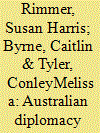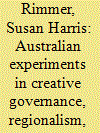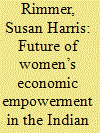|
|
|
Sort Order |
|
|
|
Items / Page
|
|
|
|
|
|
|
| Srl | Item |
| 1 |
ID:
147639


|
|
|
|
|
| Summary/Abstract |
As part of its economic diplomacy, Australia has directed intense effort into both bilateral and plurilateral trade negotiations such as the Trans-Pacific Partnership. According to then Minister for Trade and Investment Andrew Robb, with no major multilateral trade deal in decades, you have to ‘row your own boat’ or risk missing out. With the fundamentals of trade and the nature of trade negotiations changing, trade liberalisation has become an increasingly sophisticated and difficult negotiating area. A case study of the controversial TPP shows the tensions for a middle power navigating this space. The benefits of the TPP are contested and the government faces criticism of the adverse impacts of the agreement, especially investor-state dispute settlement clauses, impact on human rights and suspicion that the TPP is motivated by geopolitical drivers. In order not to lose more than it gains in moving away from the multilateral trade system, Australia must ensure that trade agreements are consistent with WTO rules and have open and fair accession regimes as a basis for signing. Finally, there is the need for higher levels of transparency and democratic accountability than has historically applied. A new white paper is necessary to make the case for trade liberalisation.
|
|
|
|
|
|
|
|
|
|
|
|
|
|
|
|
| 2 |
ID:
147634


|
|
|
|
|
| Summary/Abstract |
Peter Varghese AO, Secretary of the Department of Foreign Affairs and Trade (DFAT), refers to diplomacy as ‘the compass by which Australia makes its way in the world’. Its core task – to advance the nation’s security and prosperity – remains unchanged across decades.
|
|
|
|
|
|
|
|
|
|
|
|
|
|
|
|
| 3 |
ID:
151385


|
|
|
|
|
| Summary/Abstract |
The previous Abbott government had prioritized a general attitude to foreign policy captured by the phrase “Jakarta not Geneva,” which signified a preference for bilateral or minilateral interactions with the region rather than United Nations-based multilateralism. With Julie Bishop MP as Australia’s first female foreign minister, the Coalition also prioritized economic diplomacy, as exemplified by the repeated refrain that Australia is “open for business.”
This approach led to a preference for diplomatic venues and processes that focused on continuing investments in regional architecture, new emphasis on minilateral dialogues such as the Indian Ocean Rim Association (IORA) and Mexico, Indonesia, Korea, Turkey, and Australia (MIKTA), and more effort directed to bilateral and plurilateral processes such as the Trans-Pacific Partnership trade negotiations. This approach has been continued under Prime Minister Turnbull, with a renewed focus on innovation.
Part 1 considers minilateral and regional investments in the Indo-Pacific region, primarily, IORA, the Asia-Pacific Economic Cooperation (APEC), and the Association of South East Asian Nations (ASEAN). I consider MIKTA a unique vehicle for Australian diplomacy. Part 2 considers what issues Australia should be pursuing through these forums, with a focus on the two themes of gender equality (as an example of niche diplomacy) and trade (multilateralism under pressure) as case studies.
|
|
|
|
|
|
|
|
|
|
|
|
|
|
|
|
| 4 |
ID:
152038


|
|
|
|
|
| Summary/Abstract |
This paper seeks to explore the prospects for women’s economic empowerment in the Indian Ocean region, bringing a feminist global governance perspective to the priority Trade and Investment Facilitation and Tourism areas of the Indian Ocean Rim Association’s (IORA) work. Why would investing in women’s economic empowerment bring benefits to 1 billion women living in the IORA region, and how could such investment also benefit 21 IORA economies? Part I outlines the links between women’s economic empowerment and overall sustainable macroeconomic growth that reduces inequality. Part II sets out some of the ideas that have been developed in other governance fora, or through international organizations. Part III notes some challenges IORA’s leadership may face in pursuing this agenda. I argue that this is an area of great opportunity for IORA, and a test of whether the organization is capable of setting governance and regulatory standards expected of modern regional organizations. Further, this article argues that women are disadvantaged in international trade with a particular focus on Indian Ocean region. Trade governance that gives more precedence to women’s rights recognizes women’s participation in informal trade and seeks to formalize that participation should be core to the enterprise of IORA.
|
|
|
|
|
|
|
|
|
|
|
|
|
|
|
|
|
|
|
|
|